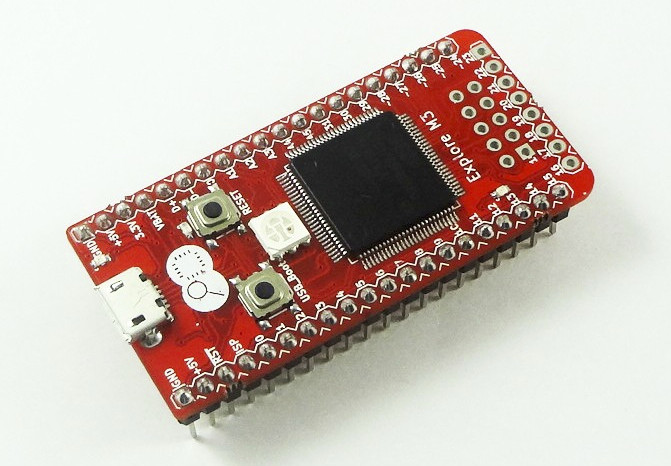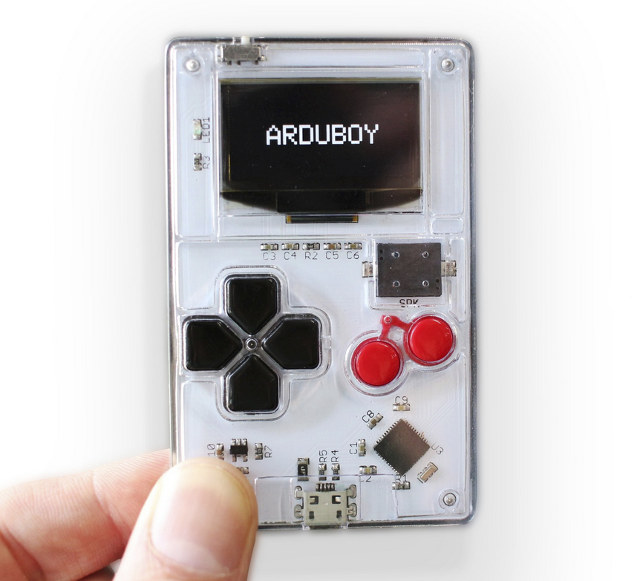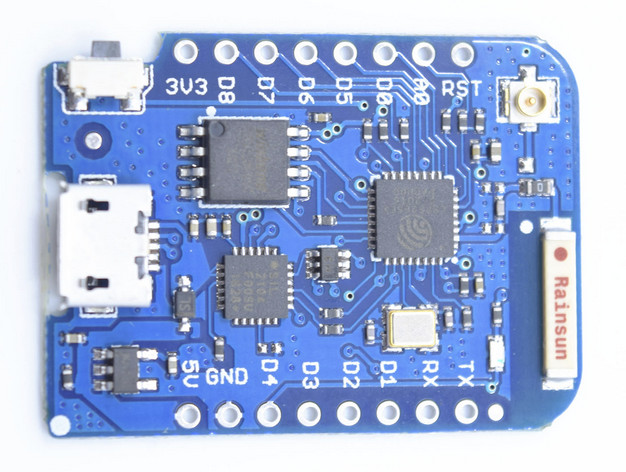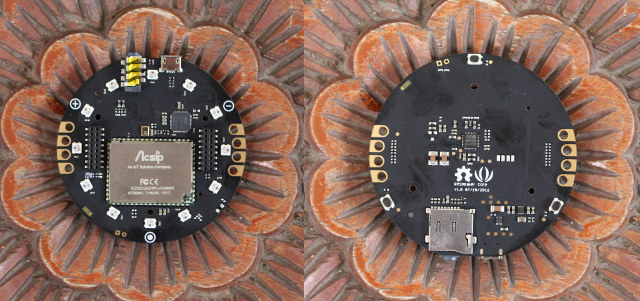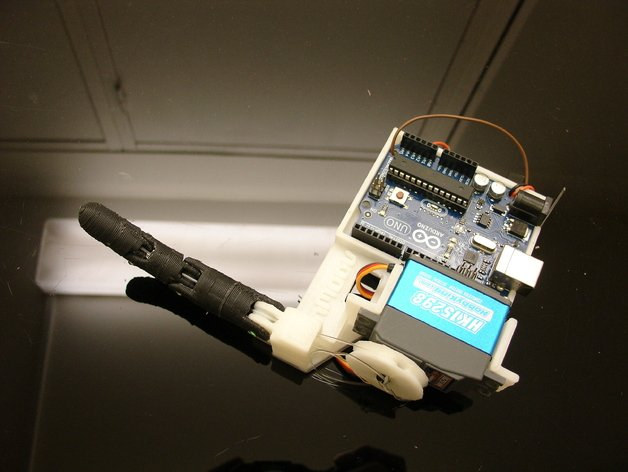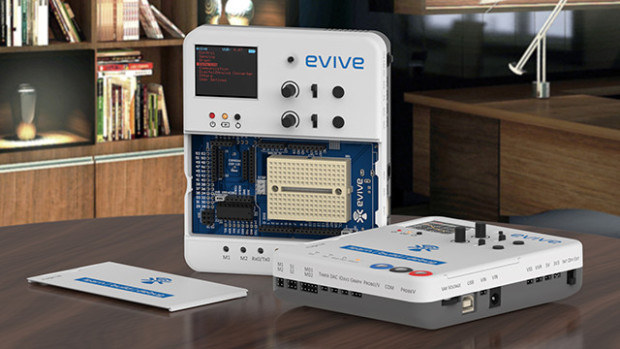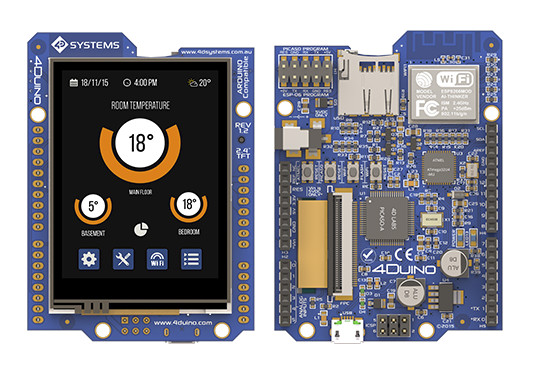Explore M3 is an ARM Cortex M3 development board powered by a micro USB port, with plenty of I/Os, Arduino compatible, and the developers have also written many tutorials to help people getting started as fast and easily as possible. A starter kit with cables and sensors is also available with the board. Specifications: MCU – NXP LPC1768 ARM Cortex M3 @ up to 100MHz with 512KB flash, 64KB RAM, USB – 1x micro USB 2.0 OTG port for programming and power Expansion Headers – 2x 20-pin male headers + 8-pin unpopulated header with 38x GPIOs, 4x UARTs, 2x CAN, 2x SPI, 2x I2C, 6x PWM, 5x ADC, 1x DAC, 2x interrupt pins, I2S audio, and power signal Debugging – JTAG/SWD Debug connector Misc – USB boot and reset buttons Dimensions – 55mm x 25mm The hardware is somewhat similar to mbed LPC1768 board but with a few more I/Os. […]
ArduBoy Arduino Compatible Portable Game Console Sells for $39
Ardubox feels like the little brother of PocketCHIP portable & hackable game console with its transparent case, but instead of running Linux on a 32-bit ARM processor, Ardubox is based on the same Atmel ATmega32u4 MCU used in Arduino Leonardo & Micro boards. Arduboy specifications: MCU – Atmel ATmega32u4 AVR MCU with 32KB flash, 2.5KB RAM, and 1KB EEPROM Display – 128×64 1-bit OLED display USB – 1x micro USB 2.0 port for power and programming User Inputs – 6x momentary tactile buttons Audio – 2 channel Piezo Speaker Misc – 1x LED Battery – 180 mAh Thin-Film Li-Po battery good for over 8 hours Beside the Arduino IDE, The board can also be programmed with Codebender, GCC & AVRDude. There’s also a fairly long list of games to play with, and it can be hacked as a virtual business card, a USB mouse and keyboard, a synthesizer, and more. […]
$5 Wemos D1 mini Pro ESP8266 Board includes 16MB Flash
Wemos D1 mini is one of my favorite ESP8266 development boards thanks to its small size, shield support, and low $4 price tag. There’s now a new version of the board – dubbed Wemos D1 mini Pro – with 16MB flash instead of 4MB for the original version, and a few other modifications. Wemos D1 mini Pro specifications: WiFi 802.11 b/g/n module based on ESP8266EX with 16 MB flash, chip antenna and external antenna connector Expansion – Through holes with 11x digital input/output pins (3.3V) supporting interrupt/PWM/I2C/one-wire (except D0 pin) 1x analog input (3.3V max input) Reset and power signals (5V, 3.3V, GND) USB – micro USB port Misc – Reset button Power – 5V via micro USB or 5V pin Dimensions – 34.2 x 25.6 mm Weight – 2.5 grams Beside the larger flash, the main differences are listed in a Wemos forum post: External antenna connector – switch […]
ReSpeaker WiFi IoT Board is Designed for Voice Interaction (Crowdfunding)
More and more devices are supporting voice interaction nowadays from your smartphone to devices like Amazon Echo, but so far, I had not seen development boards specifically designed for that purpose, and that’s exactly what Seeed Studio ReSpeaker board does by combining audio capabilities, WiFi connectivity, and I/O headers. ReSpeaker Core board specifications: WiFi Module – Acsip AI7688 Wi-Fi 802.11 b/g/n module based on Mediatek MT7688 MIPS SoC Storage – micro SD card slot USB – 1x micro USB port for programming and power Audio – 3.5mm AUX port, WM8960 audio codec, 2-pin header for external speakers Expansion – 2x 8-pin expansion headers for I2C, GPIO and USB 2.0 host connected to MT7688, built-in microphone. MCU – Atmel ATMega32U4 @ 16 MHz Misc – 12x RGB LEDs, 8x touch sensors, 3 push buttons Power Supply – 5V DC Dimensions – 70mm diameter Weight – 70 grams The board runs OpenWrt, […]
Learn the Basics of Humanoid Robots with InMoov Finger Starter Kit
In a not so distant future, most humans will live off their government provided basic income, relaxing and drinking their robot brewed, drone delivered beer or soda, opened and served by their humanoid robot maid. Well, maybe… In the meantime, it might be interesting to learn how to make humanoid robots such as InMoov, but since it’s quite complicated, it might be better to start small… with a single finger. That’s exactly what InMoov Finger Starter Kit offers you to do in order to understand the basics principles of the complete robot. The kit includes: 1x 3D printed base support in ABS 3D printed finger parts in ABS 1 meter braided 200 LB tendon 1x 5cm filament for peg/pin use to assemble finger joints 1x wheel horn adapter (Servo Pulley) 4x screws to fix the servo to the base support. You’ll also need to provide your own Arduino Uno (or […]
Teensy 3.5 & 3.6 Boards Feature NXP Kinetis K64 & K66 MCUs (Crowdfunding)
Paul Stoffregen has been making Teensy USB MCU development boards since 2008, and has just launched the latest Teensy 3.5 & 3.6 boards powered by NXP (previously Freescale) Kinetis K64 & K66 ARM Cortex-M4 MCUs with a micro USB port for power and programming, a micro SD slot, and several I/Os. Boards specifications: MCU Teensy 3.5 (T3.5) – NXP Kinetis K64 ARM Cortex M4 MCU @ 120 MHz with FPU, 512KB flash, 192 KB RAM, 4K EEPROM Teensy 3.6 (T3.6) – NXP Kinetis K66 ARM Cortex M4 MCU @ 180 MHz with FPU, 1MB flash, 256KB RAM, 4K EEPROM Storage – micro SD card port USB – 1x USB Full Speed (12 Mbit/sec) Port; T3.6 only: 480 Mbit/sec host port Connectivity – 10/100M Ethernet mac 62x I/O Pins (42 breadboard friendly) 25x Analog Inputs to 2 ADCs with 13 bits resolution 2x Analog Outputs (DACs) with 12 bit resolution 20x […]
Evive is an Arduino Compatible Platform with Enclosure, Lots of I/Os, Buttons, and an 1.8″ Display (Crowdfunding)
Engineers at Agilo Technologies, an Indian startup based in Kanpur, Uttar Pradesh, felt that the wire mess often produced while learning or prototyping with Arduino boards could be an issue, and it was easy to mis-wire your setup, so they’ve decided to create a user and student friendly Arduino compatible system with many of the items you’d normally use with Arduino board such as buttons, probes inputs, an 1.8″ color display, headers for ESP8266, Bluetooth, and XBEE moduels, etc.. and all of that enclosed in a neat case. Evive was born. Evive specifications: MCU – Atmel ATmega2560 8-bit AVR MCU @ 16 MHz with 256KB flash, 4KB EEPROM, 8KB SRAM Storage – micro SD slot up to 32GB Display – 1.8″ TFT display; 160×128 resolution; 18-bit color User inputs – Tactile and slide switches, joysticks, and potentiometers Probes inputs – Voltage / Intensity sensing inputs USB – USB device port Expansion Headers […]
4Duino-24 is an Arduino compatible 2.4″ Color IoT Display Module with Atmel MCU and ESP8266 Module
I played with ITEAD Studio NEXTION serial color displays for Arduino boards and the likes a few months ago, and while the hardware seems good and the company offer a large choice of 2.4″ to 7″ models at a very affordable price, I didn’t find the Windows software to create the user interface to be very user-friendly. 4D Systems, an Australian company specializing in “graphics solutions”, will soon launch a similar 2.4″ display, but integrated into an Arduino compatible board also featuring an ESP8266 module for WiFi connectivity. 4Duino-24 “LCD IoT Display Module” specifications: MCU – Atmel ATmega32U4 micro-controller with 32KB flash, 2.5KB SRAM, 1KB EEPROM Storage – micro SD card slot (FAT16 support) for data and logging WiFi Module – ESP8266 based with 802.11 b/g/n connectivity, 1MB flash, support for Wi-Fi Direct (P2P), soft-AP Display – 2.4” LCD-TFT resistive touch display module with 240×320 resolution, 65K colors, and powered […]


